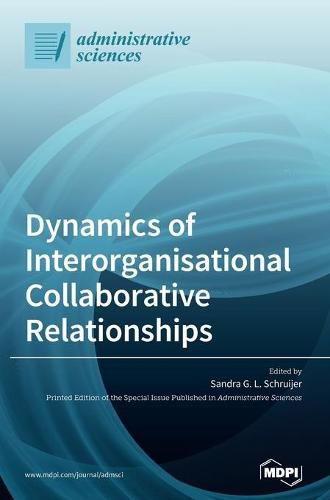Readings Newsletter
Become a Readings Member to make your shopping experience even easier.
Sign in or sign up for free!
You’re not far away from qualifying for FREE standard shipping within Australia
You’ve qualified for FREE standard shipping within Australia
The cart is loading…






This title is printed to order. This book may have been self-published. If so, we cannot guarantee the quality of the content. In the main most books will have gone through the editing process however some may not. We therefore suggest that you be aware of this before ordering this book. If in doubt check either the author or publisher’s details as we are unable to accept any returns unless they are faulty. Please contact us if you have any questions.
In all spheres of life, relationships among public and private organizations are built in order to deal with complex societal problems and to address economic challenges that cannot be dealt with by single organizations. Because of the interdependencies, interorganizational collaboration is essential, yet working across organizational boundaries is far from simple. It involves a multitude of different organizations, each having its own interests, perspectives, and identities while also varying in power and size. Further, the societal problems that are dealt with are often severe. This volume focuses on the relational complexities of interorganizational collaboration, captured by the term dynamics, referring to: (a) the social and psychological processes that occur when organizations and their representatives interact to engage in cross-boundary or collaborative work (e.g., trust and distrust, intergroup stereotyping and conflict, conflict avoidance, inclusion and exclusion of stakeholders, power dynamics), as well as (b) the development of these processes over time, in view of external and internal events and/or as a consequence of deliberate interventions to enhance collaborative success. The perspective put forward is largely psychological and sociological, both in terms of understanding the group and intergroup processes as well as efforts to intervene to develop collaborative relationships, based on action research and an organizational development approach.
$9.00 standard shipping within Australia
FREE standard shipping within Australia for orders over $100.00
Express & International shipping calculated at checkout
This title is printed to order. This book may have been self-published. If so, we cannot guarantee the quality of the content. In the main most books will have gone through the editing process however some may not. We therefore suggest that you be aware of this before ordering this book. If in doubt check either the author or publisher’s details as we are unable to accept any returns unless they are faulty. Please contact us if you have any questions.
In all spheres of life, relationships among public and private organizations are built in order to deal with complex societal problems and to address economic challenges that cannot be dealt with by single organizations. Because of the interdependencies, interorganizational collaboration is essential, yet working across organizational boundaries is far from simple. It involves a multitude of different organizations, each having its own interests, perspectives, and identities while also varying in power and size. Further, the societal problems that are dealt with are often severe. This volume focuses on the relational complexities of interorganizational collaboration, captured by the term dynamics, referring to: (a) the social and psychological processes that occur when organizations and their representatives interact to engage in cross-boundary or collaborative work (e.g., trust and distrust, intergroup stereotyping and conflict, conflict avoidance, inclusion and exclusion of stakeholders, power dynamics), as well as (b) the development of these processes over time, in view of external and internal events and/or as a consequence of deliberate interventions to enhance collaborative success. The perspective put forward is largely psychological and sociological, both in terms of understanding the group and intergroup processes as well as efforts to intervene to develop collaborative relationships, based on action research and an organizational development approach.